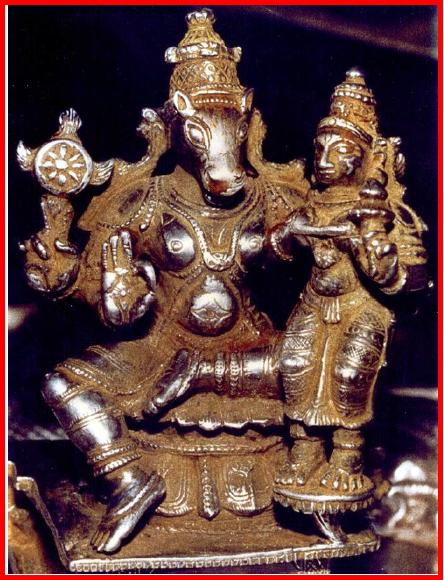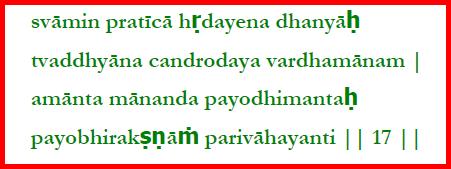
In the 17th slOkam, Swamy Desikan states that the aanandhAnubhavam of the HayagrIva bhakthAs finds an outlet through their eyes in the form of aanandha bhAshpam. The slOkam describing the state of the bhakthan with copious flow of tears of joy is as follows:
MEANING:
Oh My Master! Oh Lord HayagrIvA! The minds of few bhAgyasAlis pull their attention from external objects, just as a tortoise pulls its neck inwards. Their mind turns inward instead of outwards. In that state of deep dhyAnam, they visualize Your auspicious form. At that time, the joy experienced by their minds lifts up just as the Ocean rises on seeing the rise of the Moon (ChandrOdhayam). That immense wave of aanandham could not be contained inside anymore and it spills over like a dam that is broken. The eyes serve as an outlet for that paramAnandham and a flood of aanandha bhAshpam flows.
The indescribable bliss that arises out of the HayagrIva SaakshAthkAram (Darsanam of the form of Lord HayagrIvan in their hearts by the yogis) results in uncontrollable flood of tears of Joy associated with that aanandha-anubhavam. These are the dhanyA: or the blessed ones.
Their focus is inward (prathIchA hrudhaya:) through Indriya nigraham (control of senses). They are engaged in dhyAnam of the form of their UpAsana Moorthy.Their mental state filled with bliss is like the state of the joyous Ocean (aannadha payOnidhi) that rises uncontrollably (amaantham), when it witnesses the Chandra-Udhayam. The bhakthan’s eyes are flooded with tears of Joy (akshNAm payObhi: parivAhayanthi) that flow out without interruption.
Sri KulasEkara AzhwAr’s prayer to Lord RanganAthA longing for His darsanam and his ardent desire to have his eyes filled with tears as a result of the aanandham arising from that dharsanajanitha-sukham (yenn KaNkaL neermalha yenRu kolO niRkum naaLE) is referred to by
Sriman D.Ramaswamy Iyengar in this context.
The Rg Vedic manthram section, “ChandramA manasO jaatha:-” (Rg Vedam-Canto X.90.13) has some connection to this anubhavam. The HayagrIva-ChandrOdhayam and its effect on the mind of the UpAsakan is alluded to here.
Source
To be continued…









